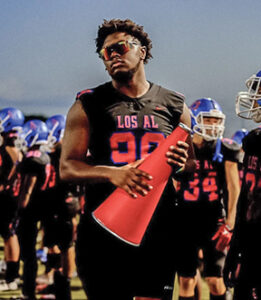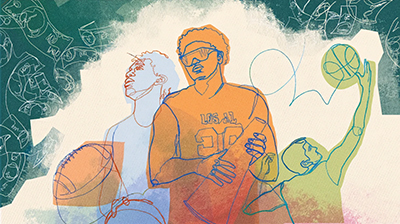“If you make a mistake, it could cost your whole college career.: said one top high school football player.

NBC News has reviewed a dozen written offers to high schoolers that experts have described as exploitative, including marketing contracts claiming exorbitant commissions of up to 40% and booster contracts with complex fee structures and legal jargon, reducing the athletes’ freedom to transfer or enter outside deals. One “contract” was just a $100,000 loan.
“One of the really surprising things is the amount of people and companies and people that have just come out of the woodwork that had absolutely no experience,” said Courtney Altemus, a former financial manager for professional athletes on Wall Street, who now educates athletes across the country through her company ADVANCE NIL.
Complicated playbook for college athletes after Supreme Court ruling on earning cash
An athletic department administrator at a school in the Southeastern Conference, speaking on condition of anonymity, said: “Once the NCAA lost in court, they basically pulled out of Afghanistan. There’s no rules. It’s crazy.”
‘Now it’s legal’
The NCAA refused to budge on the topic of athlete compensation until the summer of last year, when a Supreme Court ruling questioned the legality of its business model.

“The NCAA’s business model would be flatly illegal in any other industry in America,” wrote Justice Brett Kavanaugh in a concurring opinion for the 9-0 ruling in a case of education-related benefits, accusing the multibillion-dollar industry of suppressing athletes’ pay.
“[E]normous sums of money seem to flow to everyone but the athletes … many of whom are African American and from lower-income backgrounds.”
The NIL market that has sprouted since the Supreme Court decision includes deals from payments for autographs and social media endorsements to appearance fees for simply showing up.
About two dozen states have encoded the rights of college athletes to enter NIL deals, but the patchwork of laws and rules includes few protections for players in the newly deregulated environment. Meanwhile, in a growing number of states, including California, even high school athletes can enter contracts.
The one NCAA guardrail is that schools cannot directly offer deals to recruit players. But boosters can pay prospective students through NIL deals, as long as the money is not contingent on enrollment or athletic performance. Some “companies” offering deals are just legal shells around pools of booster money.
A University of Miami booster has earmarked $10 million to sign players to NIL deals through his companies. A University of Texas offensive lineman can get $50,000 for charity work, offered by donors who saw holes in the roster. A University of Tennessee booster collective reportedly bought NIL rights to the team’s future quarterback for $8 million.
In a statement, the University of Miami said the school’s success has “positioned us well to help our current student-athletes maximize Name, Image & Likeness opportunities during their time at the University. We are appreciative of all our supporters, many of whom have partnered with our student-athletes to help market their businesses.” Texas and Tennessee declined to comment.
Doug Fillis, whose company, Accelerate Sports Ventures, helps manage NIL within college athletic departments, said: “Boosters are looking around and saying, ‘you told me I couldn’t give an athlete a bagel and cream cheese, and now I can give a million dollars? I’ll do 4 [million].”
But recruiting inducements had long existed in the shadows, at least for family members and middlemen who positioned themselves as handlers for recruits. A quip among old-timers is that NIL stands for “now it’s legal.”
“Now, all the shady characters can come out of hiding,” said Andy Bark, who over the past few decades founded many of the top college recruiting events for high school athletes. He described middlemen and boosters who moved money through cars, prepaid debit cards, church baskets, even Starbucks cups stuffed with cash.
“The most misunderstood part is that this is not a new market. It’s just not a dirty little secret anymore.”
The free market is a welcome overcorrection to athletes, despite skepticism around “snake oil,” “early investors” and “a car salesman mentality.”
Al Amadou said he hopes to get an NIL deal in college to improve housing for his family.
“It could set you up for life,” said Al Amadou, a senior basketball prospect from Sellersville, Pennsylvania, who hopes to get an NIL deal in college to improve housing for his family. “A lot of athletes are going to try to pursue that.”
Amadou was propositioned by an extracurricular coach in the area to create a digital trading card with his highlights for an online recruiting platform. The card he designed on an introductory Zoom call remained online without his knowledge, he said, although he never profited or saw a contract.
“People will take advantage of teenagers, because you don’t know a lot,” Amadou said.
But athletic departments are growing frustrated as unaccountable boosters and agents shape the backroom market for recruits.
“Agents are basically connecting themselves to high school prospects and their families, then going around to schools saying, ‘Hey, school X is offering my guy this much money in NIL deals,’” said an athletic department administrator in a Power Five conference.
“But a lot of the numbers are made up. Anyone can call themselves an agent.”

